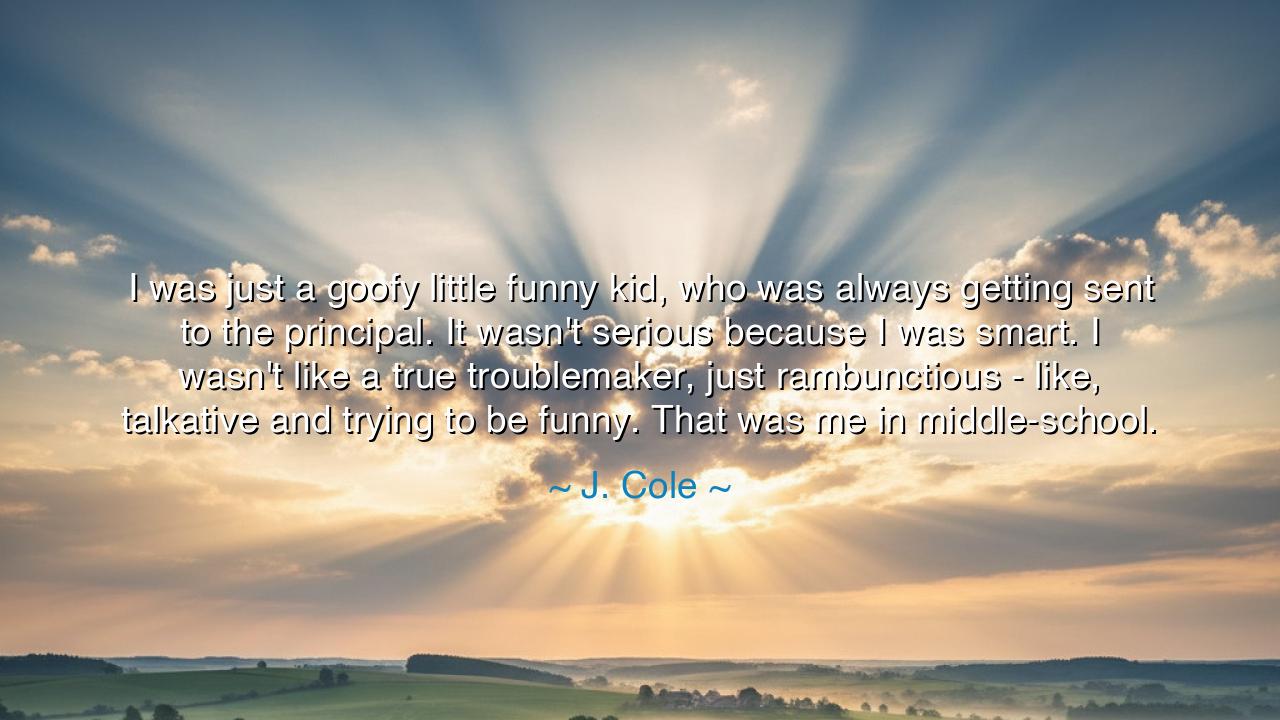
I was just a goofy little funny kid, who was always getting sent
I was just a goofy little funny kid, who was always getting sent to the principal. It wasn't serious because I was smart. I wasn't like a true troublemaker, just rambunctious - like, talkative and trying to be funny. That was me in middle-school.






“I was just a goofy little funny kid, who was always getting sent to the principal. It wasn’t serious because I was smart. I wasn’t like a true troublemaker, just rambunctious — like, talkative and trying to be funny. That was me in middle-school.” Thus spoke J. Cole, the poet of the modern streets, whose words rise from the soil of youth and the lessons of growth. Beneath his lighthearted reflection lies a truth as old as the world itself — that the seeds of greatness are often hidden in restless spirits, and that those who disrupt the silence of the classroom may one day move the conscience of nations. What he calls goofy and rambunctious was, in truth, the early stirring of creativity — that sacred fire which refuses to sit still.
In the schools of every age, there have been children like this — bright, impatient, and endlessly curious. The wise teacher does not seek to extinguish their laughter or punish their energy, but to guide it, as one channels the current of a mighty river. J. Cole’s mischief was not rebellion but overflow: an abundance of thought and spirit that could not be contained by walls or timetables. The talkative child, the class clown, is not always seeking trouble; often, he is seeking connection — to make others smile, to turn the dullness of routine into the rhythm of joy. It is from such beginnings that the artist is born.
In the ancient world, such souls were revered as the tricksters — those who danced at the edges of order, challenging dull conformity with wit and play. The Greeks told of Hermes, who, while still a child, stole Apollo’s cattle and invented the lyre — mischief and music born in the same breath. So too did J. Cole, in his own time, learn to shape his energy into art. His words, once thrown like pebbles of laughter across the classroom, would one day become verses that echo across the world. What others mistook for foolishness was the playfulness of genius, the early trembling of a voice that could not yet name its calling.
Consider too the life of Albert Einstein, who as a boy was reprimanded for his daydreaming. Teachers called him lazy, distracted — unfit for structure. Yet it was his wandering mind, his refusal to conform, that led him to glimpse the fabric of the cosmos. There is a lesson in this that stretches across time: disruption is not always disorder. Often, it is the soul’s first attempt to shape its own path. The same energy that once drew Cole to laughter and trouble became, with wisdom and purpose, the rhythm that fuels his music — a voice that uplifts, questions, and heals.
J. Cole’s reflection also reveals something deeper — the beauty of self-awareness. He does not hide from his youthful chaos, nor does he glorify it. He recognizes it as part of his becoming. “It wasn’t serious because I was smart,” he says — and here lies wisdom. Intelligence without humility can destroy, but intelligence joined with humor creates balance. The child who laughs learns resilience; the youth who questions learns courage. His story teaches us that to be alive, truly alive, is to carry both laughter and discipline, both curiosity and direction.
This is the path of growth — to refine without erasing, to mature without forgetting the spark of childhood. The same mischief that once led to the principal’s office can, in time, become the passion that drives creation, the charisma that inspires others, the leadership that guides a generation. The ancients would call this the transformation of chaos into harmony, a divine process in which youthful wildness becomes creative power.
Therefore, my friend, take heed of this lesson: do not despise your youthful energy, nor the energy of those who seem too restless, too loud, too playful. Within such spirits lies potential waiting to be shaped. Honor your spark — but learn to guide it. Laugh, but listen. Play, but create. If your heart is restless, let it not lead you to destruction, but to discovery. For as J. Cole shows, the “goofy little funny kid” who could not stop talking may grow to speak truths that awaken the world.
And so, carry this wisdom forward: the same fire that gets you in trouble can, with purpose, light the way. Never be ashamed of your energy or your voice. Nurture it. Discipline it. Turn it into something that builds rather than breaks. For from the laughter of the child may rise the wisdom of the poet — and in that transformation lies the very soul of greatness.






AAdministratorAdministrator
Welcome, honored guests. Please leave a comment, we will respond soon